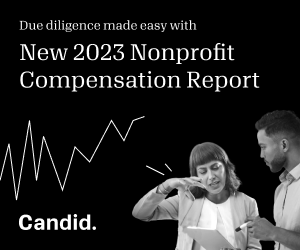A call to move beyond trust-based to care-based philanthropy
In the realm of philanthropy, we speak of trust as a cornerstone upon which meaningful relationships between funders and nonprofits are built—and rightfully so. However, trust is often bandied about by funders as a panacea for the wounds inflicted by generations of neglect, dysfunction, and power imbalances between funders and nonprofits, especially those led by and for women and nonbinary people of color. Yet, as we stand at the precipice of a new era, there’s a resounding demand for a radical shift. Trust, crucial as it may be, needs a companion—a deeper acknowledgement of the intricate dynamics at play in these relationships.
It's time to move beyond superficial discourses of trust and weave a narrative that embraces a transformative vision of care.
Chronic underinvestment
In 2020, a landmark study from the Ms. Foundation for Women, Pocket Change: How Women and Girls of Color Do More with Less (Pocket Change 1.0), revealed that philanthropic support for women and girls of color accounts for just 0.5 percent of total foundation giving. In a new report, Living with Pocket Change: What It Means to Do More With Less (Pocket Change 2.0), we interviewed partners and movement leaders to examine the impact of this chronic philanthropic underinvestment and disinvestment in the leadership of women and nonbinary people of color and the organizations they lead and to learn more about their experiences and the real-life consequences of having to do more with less. And it’s abundantly clear that current working conditions are not sustainable.
In the wake of the COVID-19 pandemic and 2020’s “racial reckoning” in response to the murder of George Floyd, there were several noteworthy developments, including a surge in financial commitments from philanthropic and corporate entities to confront white supremacy while uplifting leadership from women and nonbinary people of color. The Philanthropic Initiative for Racial Equity’s report Mismatched: Philanthropy's Response to the Call for Racial Justice found that a mere $3.4 billion in racial equity grants and $1.35 billion in racial justice grants were actually distributed. But that progress, and the progress made by the activists who came before us, are under constant attack. Conservative backlash has already begun to erode hard-fought civil rights, women’s rights, LGBTQ+ rights, and more.
A profound crisis of burnout
As we delve into the narratives of women and nonbinary leaders of color, a harsh reality emerges. The very champions we lean on to fiercely advocate for abortion access, bodily autonomy, voting rights, democracy, trans rights, affordable housing, child care, community safety, living wages, and economic opportunity are, in essence, the first responders in our communities, organizations, and movements. Yet, dishearteningly, they’re not met with the level of support, trust, or respect their monumental work warrants. These leaders, vanguards in the struggle for justice, receive the smallest share of philanthropic funding, and receive smaller and more restrictive grants. They also bear the weight of an inordinate amount of unseen and unpaid labor in their homes, communities, organizations, and interactions with philanthropy. Consequently, they find themselves facing a profound crisis of burnout—and pondering an exit from the movement. Their efforts demand more than accolades; they demand an urgent recalibration of our collective appreciation for the work they do, the role they play, and the support they really need.
One leader said:
“My expectation was that I would leave the work because I felt like social justice had betrayed us, or I felt betrayed by social justice. I was heavy. I was tired. I got tired of seeing…Black pain, Black death. I just got tired…that’s when I started looking more deeply around the loss and the grief, and really rethinking how we could do this work. How I could do this work in a way that was emotionally safe for me, and non-traumatizing, and not also traumatizing others.”
Picture a philanthropic sector that comprehensively and fully resources movement leaders and organizations. Imagine significant investments not just in projects but in the very leadership and capacity building of women and nonbinary individuals who are at the forefront of social change. Envision a space that allows for flexibility to innovate and, crucially, to fail—a space that acknowledges failure not as a setback but as an opportunity for growth and learning. This vision includes fostering intentional relationships of deep trust and care for leaders, organizations, and movements. It acknowledges the toll of systemic oppression, the weight of leadership, and the historical harm created by philanthropy. It recognizes the need for leaders to rest, recover, and heal from the relentless strain of their work. And it recognizes the need for an unwavering commitment to their success, even in tumultuous times.
The call for care-based philanthropy
In response, the call for care-based philanthropy rises above the noise. Care, in this context, signifies “an effort made to do something correctly, safely, or without causing damage; things that are done to keep someone healthy, safe, etc.” Care in philanthropy means reframing how we perceive resources.
Resources are not solely about the grant money funders provide, the financial stewardship, or return on the least possible investment. Rather, resources are the women and nonbinary leaders of color themselves, and the social justice organizations they have built. Our frontline leaders require more than just an increase of funding. We must see and care for them as the valuable resources they are, as it is their leadership driving social movements and the societal change we seek for our future. This paradigm shift requires minimizing emotional labor and addressing power imbalances.
The framework of trust-based philanthropy provides an excellent starting point for reshaping the unjust power dynamics between funders and nonprofit organizations, while also highlighting the need to address systemic and structural barriers that hinder nonprofits from receiving the funding necessary to create meaningful impact. However, there’s still a long way to go, and it’s imperative for the philanthropic sector to continue to evolve and persist in developing fully aligned practices that value and center community. We must continually assess and interrogate our practices. Are we creating repair or more damage? Are we being transactional or relational?
At the Ms. Foundation, these fundamental considerations drove us to launch the Activist Collaboration and Care Fund to invest in the healing, rest, safety, and survival of the people and organizations who lead our movements—and the response has been overwhelming. Nearly half of the requests we received this year were for healing, rest, and restoration work,which highlights the need for movement leaders and organizations to create space for healing and rest amid compounding crises, scarce resources, and increasing demand for their services.
Philanthropy stands at a crossroads—a choice between maintaining the status quo and embracing radical transformation. It’s a call to redefine our role as philanthropists, placing change agents at the heart of our efforts. By investing in the care of those we serve, we move beyond superficial support to create a compassionate force that propels leaders and organizations not just to survive but to thrive and amplify their impact.
Care-based philanthropy is not just a vision; it’s a necessity for a more just and equitable future and the foundation upon which, when sustained, impactful work can be built.
Shawnda Chapman is director of innovative grantmaking and research at the Ms. Foundation for Women.






